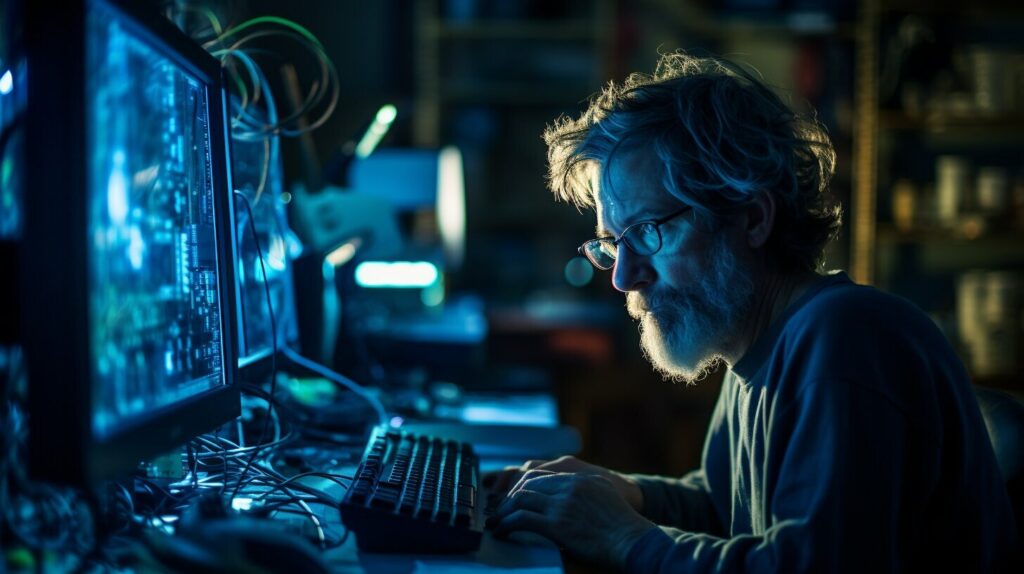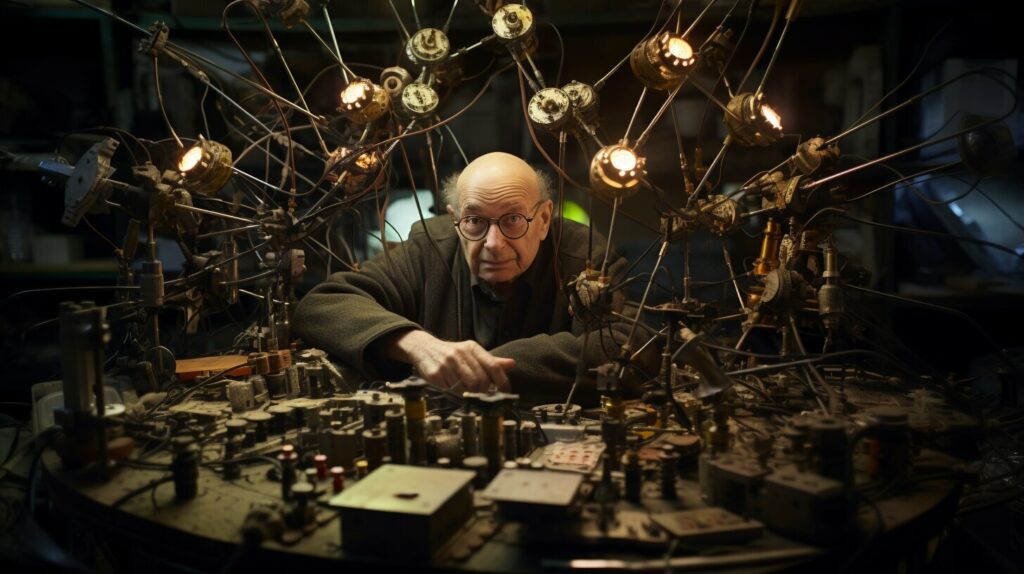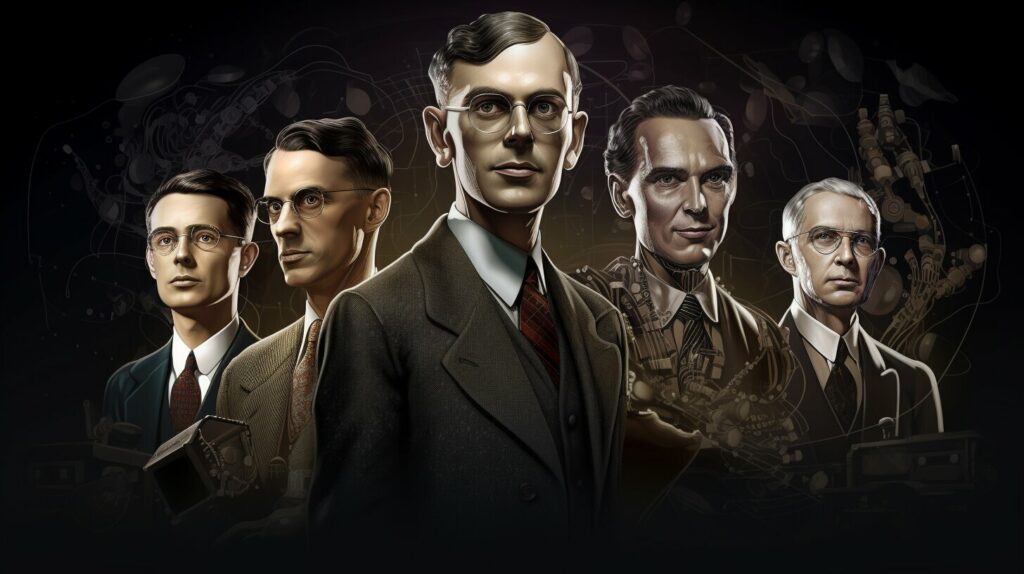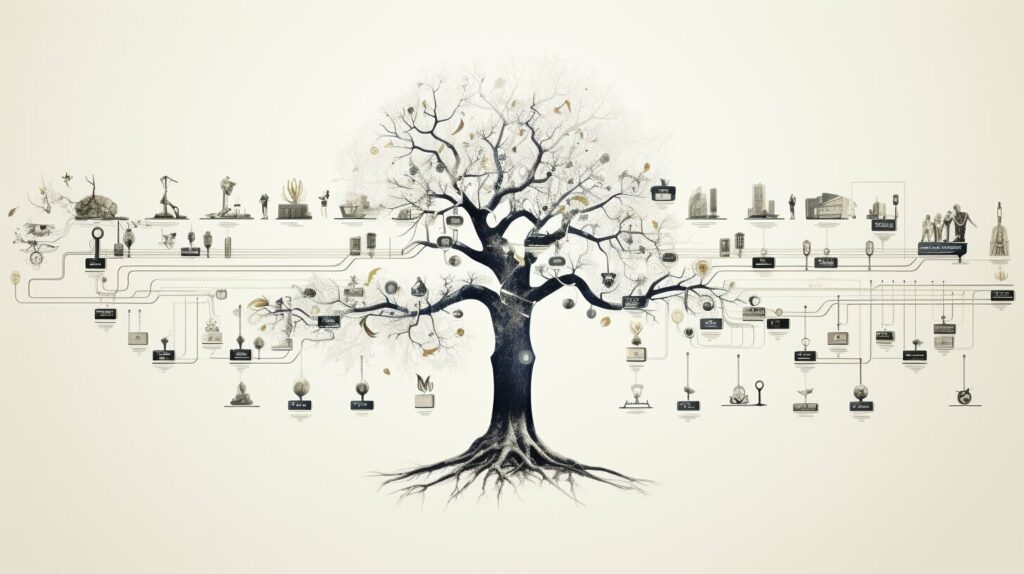
Artificial intelligence (AI) owes its origins to a group of pioneers and innovators who paved the way for this groundbreaking technology.
From the mid-20th century onwards, people such as Alan Turing, Allen Newell, Herbert A. Simon, John McCarthy, and Marvin Minsky made important contributions to the development and promotion of AI.
Turing, known as an AI pioneer, laid the foundation for modern computers with his work on the universal Turing machine. His insights into machine learning and the concept that machines learn from experience have been instrumental to the field of AI.
Newell and Simon revolutionized information processing thanks to their collaboration. They established AI research centers, including one at Carnegie Mellon University, and created the General Problem Solver, a machine designed to solve complex problems using analytical techniques.
John McCarthy played a pioneering role in AI programming by inventing Lisp, a programming language that became vital to AI research. Also organizing the first conference on artificial intelligence and greatly contributed to bringing AI to the academic world.
Marvin Minsky, on the other hand, focused on intelligent machine engineering and co-founded the MIT Artificial Intelligence Laboratory. His work developing the first e-learning system and exploring human-like common sense reasoning in machines propelled the field forward.
These leading figures, along with others, were instrumental in the development and promotion of AI. His visionary ideas and innovative work have laid the foundation for the advancements in AI seen today.
Key takeaways:
- The promoters and creators of AI date back to the mid-20th century.
Alan Turing played a crucial role in the development of AI, pioneering the concept of machine learning. - Allan Newell and Herbert A. Simon revolutionized information processing and created the General Problem Solver.
- John McCarthy’s contributions to AI include the invention of the Lisp programming language and organizing the first conference on AI.
- Marvin Minsky explored the engineering of intelligent machines and co-founded the MIT AI Laboratory.
Alan Turing: a pioneer in AI
One of the first contributors to AI was the brilliant mathematician and computer scientist Alan Turing. His groundbreaking work in the 1930s laid the foundation for modern computers and the concept of a universal Turing machine. Turing’s visionary ideas and insights into machine learning continue to shape the field of AI to this day.
Turing’s contributions to AI were not limited to theoretical concepts. During World War II, he played a key role in British code-breaking efforts, using his expertise in mathematics and computing to decipher enemy messages. His work at Bletchley Park, the top-secret code-breaking centre, significantly influenced the outcome of the war.
Turing introduced the concept that machines learn from experience and solve new problems through guiding principles, known as heuristics. Their theoretical framework laid the foundation for the development of AI algorithms that can adapt and improve over time.

Las contribuciones de Alan Turing al campo de la IA siguen inspirando a investigadores y tecnólogos de todo el mundo. No se puede subestimar su legado como pionero en IA y su impacto en el desarrollo de sistemas informáticos. Los avances que vemos hoy en la IA se deben en gran medida a las ideas visionarias y al trabajo innovador de este extraordinario individuo.
Allen Newell and Herbert A. Simon: revolutionizing information processing
Allen Newell and Herbert A. Simon made significant advances in AI by developing advanced software and hardware systems for processing complex information. Their collaboration led to groundbreaking achievements in the field, making them key figures in the early days of AI research.
Together, Newell and Simon founded one of the first AI research centers at Carnegie Mellon University, attracting top talent and fostering an environment of innovation. His pioneering work focused on creating intelligent machines that could solve complex problems using analytical techniques.
One of his notable achievements was the creation of the General Problem Solver, a machine designed to address various problems using a set of guiding principles known as heuristics. This system marked a significant advance, as it demonstrated the potential of machines to possess problem-solving capabilities similar to human intelligence.
Through their research and inventions, Newell and Simon laid the foundation for the development of AI as a field of study. Their contributions continue to shape the advancements we see today, making them fundamental to the evolution of artificial intelligence.

“The ultimate goal of artificial intelligence is to provide machines with the ability to understand, reason and learn from experience, just as humans do.” -Allen Newell
“AI is not simply about creating machines that imitate human intelligence, but rather about developing systems that can augment and amplify our cognitive abilities.” – Herbert A. Simon
John McCarthy: a pioneer in AI programming
John McCarthy played a pivotal role in AI, with his groundbreaking work in programming languages and his efforts to establish AI as an academic discipline. McCarthy’s most significant contribution to the field was the invention of Lisp, a programming language that became the standard tool for AI research. Lisp had built-in support for symbolic processing and allowed programmers to express complex algorithms in a concise and elegant way. Its flexibility and power made it ideal for developing AI applications.
In addition to his linguistic design, McCarthy was instrumental in organizing the Dartmouth Conference in 1956, widely considered the first conference on artificial intelligence. This event brought together researchers from various disciplines and laid the foundation for AI as an academic field. It was at the Dartmouth Conference that the term “artificial intelligence” was coined and McCarthy’s vision of AI as a scientific enterprise gained traction.
AI in academia
McCarthy’s efforts went beyond inventions and lectures; He played a key role in promoting AI in academia. He joined Stanford University and established one of the first AI research laboratories. Through his teaching and mentorship, McCarthy inspired a generation of AI researchers and fostered an environment of innovation and collaboration.

John McCarthy’s legacy in AI programming and academia cannot be underestimated. His pioneering work in programming languages and tireless efforts to advance AI as a discipline have paved the way for the advances we see in artificial intelligence today. McCarthy’s influence can still be felt in the work of countless researchers and practitioners who continue to push the boundaries of AI innovation.
Marvin Minsky: intelligent machine engineering
Marvin Minsky, a visionary in his own right, pushed the boundaries of AI by focusing on the engineering of intelligent machines and promoting the concept of e-learning. His groundbreaking work at the MIT Artificial Intelligence Laboratory revolutionized the field and laid the foundation for the development of sophisticated AI systems.
Minsky’s pioneering efforts in the 1960s led to the creation of the first e-learning system, which aimed to simulate human-like cognitive abilities. He believed that machines could acquire knowledge and reason similarly to humans, challenging the prevailing beliefs of the time. By developing innovative algorithms and architectures, Minsky paved the way for future advances in machine learning and artificial neural networks.
“We are building intelligent machines that will be our most important creations.” –
Marvin Minsky
Minsky’s collaboration with other AI luminaries at the MIT AI Lab facilitated remarkable progress. Together they explored diverse topics such as computer vision, natural language processing and robotics, laying the foundation for interdisciplinary AI research. His work not only expanded our understanding of intelligence, but also contributed to practical applications in fields such as healthcare, finance, and transportation.
In recognition of his immense contributions, Marvin Minsky received numerous accolades, including the Turing Award, considered the highest honor in computing. His legacy continues to inspire future generations of AI researchers and engineers, reaffirming the profound impact of his work on the advancement of artificial intelligence.

Other notable contributors in AI
In addition to the aforementioned pioneers, there were many other people who made significant contributions to the advancement of AI. These visionaries and innovators brought their unique perspectives and experience to advance the field of artificial intelligence. Their groundbreaking work pushed the boundaries of what was considered possible and paved the way for the AI advancements we see today.
One such notable contributor to the field of AI is Douglas Engelbart. He is widely recognized for his invention of the computer mouse, a device that revolutionized the way we interact with computers. Engelbart also played a crucial role in the development of graphical user interfaces and collaborative software tools, making complex technological tasks more accessible and easier to use.
Another key figure in AI is Ray Kurzweil, a prominent author and futurist. Kurzweil has made significant contributions to AI research, particularly in the field of natural language processing and speech recognition. His inventions and theories have contributed to the development of intelligent systems capable of understanding human language and communicating effectively.
Additionally, Yoshua Bengio, Geoffrey Hinton, and Yann LeCun, often called the “godfathers of deep learning,” have made notable contributions to the advancement of AI algorithms. His innovative research and algorithms have greatly improved the capabilities of machine learning models, allowing them to process and understand complex data with unprecedented accuracy.
Exemplary contributions to AI
A notable example of his contributions is the development of convolutional neural networks (CNN), a specialized architecture that has revolutionized computer vision and image recognition tasks. The advances made by Bengio, Hinton, LeCun and their colleagues have paved the way for major advances in AI applications, from autonomous vehicles to medical diagnostics.
As the field of artificial intelligence continues to evolve and expand, it is essential to recognize the contributions of these notable individuals. Their dedication and relentless pursuit of innovation have shaped the trajectory of AI, laying the foundation for a future where intelligent systems and human intelligence collaborate to solve complex problems and improve our lives.

The evolution of AI: a historical perspective
To truly understand AI, it is essential to take a step back and examine its evolution over time. The history of AI dates back to the mid-20th century, with pioneers such as Alan Turing, who laid the foundations of modern computing and the concept of a universal Turing machine. Turing’s work in the 1930s paved the way for artificial intelligence, when he introduced the idea that machines learn from experience and solve new problems using heuristics.
As technology advanced, other notable contributors to the field of AI emerged. Allen Newell and Herbert A. Simon collaborated in the development of software and hardware systems for processing complex information. Together they founded one of the first AI research centers at Carnegie Mellon University and created the General Problem Solver, a machine designed to solve various problems using analytical techniques.
John McCarthy, known as the father of AI, played a pivotal role in bringing AI to academia. He invented Lisp, a programming language that became the standard tool for AI research. McCarthy also organized the first conference on artificial intelligence in 1956, which marked an important milestone in the development of this field.

Marvin Minsky, another influential figure, focused on designing intelligent machines and imparting human-like common sense reasoning to them. He co-founded the MIT Artificial Intelligence Laboratory and created the first e-learning system, contributing to the advancement of AI research.
The impact of AI promoters and creators
The contributions of AI promoters and creators have had a profound impact on various industries and have paved the way for numerous technological advancements. Through their visionary ideas and innovative work, these pioneers have revolutionized the field of artificial intelligence, shaping its evolution and driving innovation.
AI pioneers such as Alan Turing, Allen Newell and Herbert A. Simon, John McCarthy and Marvin Minsky have left an indelible mark on the world of technology. Their research and inventions have transformed the way we interact with machines, allowing us to perform tasks that were previously unimaginable.

“The development of complete artificial intelligence could mean the end of the human race,” warned renowned physicist Stephen Hawking. While the implications of AI technology are a topic of debate, there is no denying the immense impact it has already had and continues to have on our society. From autonomous vehicles to voice-activated assistants and predictive analytics, AI has permeated several sectors, including healthcare, finance, transportation and entertainment.
The impact of AI pioneers extends beyond specific industries. Their work has sparked a wave of AI research and development around the world, attracting brilliant minds to push the boundaries of what is possible. Advances in machine learning, natural language processing, and computer vision owe a debt to these pioneers.
Looking ahead: the future of AI
As AI continues to evolve, driven by the creative minds of today and tomorrow, we can expect even more transformative advances. From tackling complex global challenges to empowering people with intelligent technologies, AI has immense potential to shape the future of humanity.
With each passing day, the impact of AI proponents and creators grows, penetrating deeper into our lives and transforming industries in ways we cannot yet fully understand. As we navigate this AI-driven era, it is crucial to reflect on their contributions and appreciate the immense influence they have had on our world.
Conclusion on AI promoters and creators
The promoters and creators of AI have left an indelible mark on the world, forever changing the way we perceive and interact with technology. From Alan Turing’s early contributions in the mid-20th century to the groundbreaking work of people like Allen Newell, Herbert A. Simon, John McCarthy, and Marvin Minsky, the field of AI has seen remarkable progress.
Alan Turing’s pioneering insights into machine learning and his development of the Universal Turing Machine laid the foundation for modern computers and artificial intelligence. His ideas about machines learning from experience and solving new problems using heuristics laid the foundation for AI research.
The collaboration of Allen Newell and Herbert A. Simon revolutionized information processing with the creation of the General Problem Solver and the establishment of AI research centers. His work paved the way for the development of complex software and hardware systems.
The contributions of John McCarthy, who created the Lisp programming language and played an important role in promoting AI in academia, cannot be underestimated. McCarthy’s efforts propelled AI into the academic sphere and influenced future generations of AI researchers.
Marvin Minsky’s focus on engineering intelligent machines and his work at the MIT Artificial Intelligence Laboratory pushed the boundaries of what AI could achieve. His exploration of human reasoning in machines and the creation of the first electronic learning system were truly groundbreaking.
These AI pioneers, along with many others, have shaped the progress of the field and continue to inspire future innovations. His visionary ideas and innovative work have paved the way for the advancements in AI we see today. As we move forward, it is essential to recognize and celebrate the contributions of these remarkable people who have forever transformed the world of technology.




